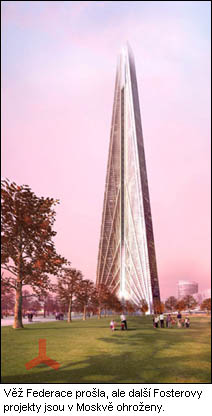
The Moscow mayor does not like Norman Foster's project
 |
Two years ago, it was already decided to demolish the former largest hotel in the former Soviet Union and Europe. The Moscow city hall deemed the concrete monster with a tall rectangular tower unsuitable for the development of the city. Demolition began this spring. The tender for the redevelopment of the site on the banks of the Moskva River was won by ST Development for 800 million dollars, which, after several unsuccessful attempts with Russian architects, approached Foster.
The Brit prepared a redevelopment proposal that included ten to eleven new buildings. These were to comprise apartments, offices, a hotel, and a parking lot with 2000 spaces. The complex was also to include a museum and in the center, an oval cultural center. Foster estimated that a quarter of the 456,630 square meters of buildings would be designated for culture.
"Maybe I'm getting old, but this is not Moscow," the mayor commented on the proposal, who celebrated his 70th birthday a month ago. However, experts criticize Foster's proposal mainly for the height of some of the buildings, several of which were designed to be ten stories tall.
"Why did we decide to demolish Rossiya? So that not only the Spasskaya Tower could be seen from the embankment, but also the domes of St. Basil's Cathedral. And this was blocking even the Kremlin," explained the disagreement by the chief Moscow architect Alexander Kuzmin. Foster is well regarded in Moscow, noted for the design of the "Federation Tower" - a 600-meter tall skyscraper currently under construction in the Moscow-City business area. He also designed parts of Astana, the new capital of Kazakhstan, which rose in the steppe.
The Rossiya Hotel was built in the 1960s on an empty site near Red Square, where the eighth and largest of Stalin's Moscow skyscrapers was originally supposed to stand. The dictator's death prevented its construction, and the completed foundations were ultimately used for the hotel. Both buildings were, after all, designed by the same architect Dmitry Chechulin. The concrete behemoth elegantly solved the problem of where to accommodate the enormous number of delegates from party congresses who came to Moscow from all over the Soviet Union.
In the shadow of the former enormous hotel with two cinemas, whose skeleton is to be leveled by spring 2007, some of the oldest buildings of medieval Moscow huddle on Varvarka Street.
The English translation is powered by AI tool. Switch to Czech to view the original text source.
0 comments
add comment









